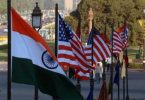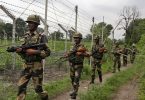A National Investigation Agency (NIA) court in Kochi on Tuesday found three men from north Kerala guilty of recruiting youngsters to the Islamic State (IS) terror outfit with the intention of widening its activities and waging a war against the country. The court will pronounce the quantum of sentence against them on Friday.
The trio recruited at least 20 persons to the strife-torn areas of Syria in 2015, according to the prosecution case. Known as Valappattanam IS module case, it was handed over to NIA in 2017 after an initial probe by the Kerala police.
The three convicted– U K Hamsa, K V Abdul Razaq and M Midilaj– are natives of Kannur. Midilaj and Abdul Razaq, both 30 years old, were arrested by the Turkish police while they were planning to cross over to the war-torn Syria.
After spending two months in jail in Turkey they were extradited to India in November 2016. According to the prosecution, Hamsa, a native of Thalassery, acted as an ideologue and was involved in spreading the ideology of the banned outfit discreetly.
The NIA court judge Anil Bhaskar found them guilty under Sections 38 and 39 of the Unlawful Activities Prevention Act (UAPA) (waging war against the country and supporting a terror outfit to weaken the country) and Section 120 B (criminal conspiracy) of the Indian Penal Code (IPC).
During the investigation, the agency found that U K Hamsa, a professional cook better known as Biryani Hamsa, acted as a propagandist of the IS ideology in north Kerala and helped radicalise at least 20 youngsters, while the whereabouts of some others are still unknown.
NIA reportedly got hints of Hamsa when another native of Kannur, K Shajehan, was deported from Turkey. The arrest of Hamsa, who is known as a “biryani expert”, sent shockwaves in the area.
The intelligence agencies found that during his stint in the Gulf Hamsa (60) was closely associated with a Bahrain-based religious centre Al Ansar, which was suspected to be a school for radicalisation. He reportedly came to the country in 2004 and took up his profession but he was discreetly involved in spreading the ideals of the IS, said a senior official who initially investigated the case. “His arrest was a big catch. A well-known person, nobody doubted his intentions,” he said.
After he was found guilty Hamsa pleaded to the court that he has already spent five years in jail and his “religious aberrations” were corrected now but the prosecution said he played a key role in radicalising many youngsters and deserved maximum punishment.
Relatives of the convicts were not available for their comments.
The IS connection of north Kerala came to light in 2016 after 21 persons were reported missing and later some of them were traced to IS-held areas in Syria and Afghanistan. Most of them belonged to upper middle-class families and were well-educated. Among the missing, two men and three women were converts from other religions. Out of 21, the relatives got information about the deaths of seven, all male members.
The Kerala police arrested two persons from Mumbai–Arshid Qureshi and Rizwan Khan– who allegedly played a key role in recruiting them to the IS-led areas and dispatching them abroad via Middle-East.
Qureshi, an associate of controversial preacher Zakir Naik, was held in connection with the disappearance of Merin alias Mariyam, a resident of Kochi.
Merin’s brother filed a police complaint saying Qureshi had tried to convert him also during a meeting in Mumbai in 2015. Both Arshid Qureshi and Rizwan Khan are in jail now. Most of the relatives disowned the missing youngsters saying they have brought disrepute and shame to the country and community.
In 2020, a video of two women, Nimisha and Merlin, surfaced on social media along with their children, where they said they were disappointed with their life in Afghanistan, were keen to come back to India and are ready to face the law. Intelligence agencies confirmed that these widows were in a jail in Afghanistan. The Union ministry of external affairs said that the government has no plan to bring them back to the country.







